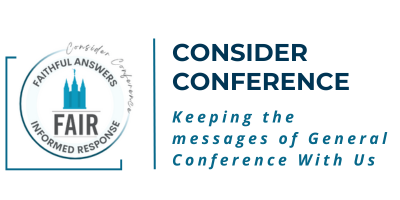
Letting General Conference Move Us From Receiving to Reaching
Have you ever wondered why some people seem so confident in God’s love—while you’re just hoping you haven’t let Him down too much?
In a world where many wrestle with feelings of unworthiness and question their standing before God, Elder Karl D. Hirst offers a deeply personal and healing reminder in God’s Favourite: you are already completely loved. You don’t have to earn it. You can’t break it. And no matter how broken you feel, God’s love still reaches you.
This comforting message isn’t just for those who feel far away—it’s also for those navigating grief, discouragement, or doubts about their leaders. Elder Hirst’s insights resonate with this week’s Come, Follow Me focus on lifting our voices to declare the gospel (D&C 30–36), especially as we reflect on stewardship and the fallibility of those called to lead. His talk reminds us that Christlike love is both the message and the method of sharing the gospel—even when we, or our leaders, are imperfect.
For those who are struggling—and isn’t that all of us, in one way or another—General Conference becomes sacred ground: a forum where God offers solace, perspective, and direction through the Spirit as at no other time. In that holy space, we are reminded that our covenants are not performance reviews but relationships—anchored in Christ’s perfect love, not our perfection. Elder Hirst gently invites us to act on the revelation we receive: to reach toward God, to reach toward others, and to let our lives be rooted in love. As we respond, we step into our own stewardship, to “preach [His] gospel… with the Spirit and with power” (D&C 36:6)—not just in what we say, but in how we love, lift, and live.

 Apologetic Issues: Fallibility and Stewardship of Church Leaders
Apologetic Issues: Fallibility and Stewardship of Church Leaders
Criticism: If Church leaders are fallible, how can we trust them to receive revelation or act as God’s representatives? Doesn’t acknowledging their mistakes weaken their authority?
Response: Divine stewardship does not imply infallibility.
Recognizing the fallibility of leaders does not negate their divine stewardship. In fact, it reinforces a central gospel truth: God works through imperfect people to accomplish His perfect purposes. Elder Hirst affirms that “our covenants are not performance reviews but relationships.” The same divine love that embraces our flaws sustains our leaders in their callings.
Solution: Trust in Christ—not in perfection—sustains our faith in inspired leadership.
Rather than expecting perfection, we trust in the Lord who calls imperfect servants—and we look for fruit, not flawlessness, in their stewardship.
 Common Fallacy: Perfectionism Fallacy
Common Fallacy: Perfectionism Fallacy
This criticism reflects the Perfectionism Fallacy, which assumes that only flawless individuals can hold spiritual authority or receive revelation.
- Definition: The Perfectionism Fallacy insists only flawless individuals can lead or receive revelation.
- Application: This fallacy undermines the consistent biblical and Restoration pattern of God calling the weak and humble.
Expecting prophets or apostles to be perfect misunderstands both human nature and divine grace. Prophets are not worshipped; they are witnesses—called by God, shaped by their own spiritual wrestles, and refined through the same covenants and love that sustain all of us.
 Apologetic Application: Divine Love and the Covenant Relationship
Apologetic Application: Divine Love and the Covenant Relationship
 Core Doctrine
Core Doctrine
God’s love is constant, personal, and redemptive. It is not withdrawn because of our imperfection, nor is it dependent on achievement. The doctrine of divine love assures us that God’s relationship with His children is rooted in covenants, not conditions.
 Scriptures: Isaiah 54:10, Jeremiah 31:3, 1 Corinthians 13:8
Scriptures: Isaiah 54:10, Jeremiah 31:3, 1 Corinthians 13:8
Defending Core Beliefs
1⃣ Common Misconception:
If I feel distant from God—or feel nothing at all—it must mean I’ve failed, or that God must have withdrawn His love.
 Clarification: Elder Hirst powerfully refutes this: “Being loved is definitely not the same as feeling loved.” God’s love is not diminished by our brokenness. On the contrary, Jesus chose to be “bruised, broken, [and] torn” for us (Hymns, no. 181)—not so we would avoid brokenness, but so we could be made whole through His love. Feeling far from God does not mean we are far from Him.
Clarification: Elder Hirst powerfully refutes this: “Being loved is definitely not the same as feeling loved.” God’s love is not diminished by our brokenness. On the contrary, Jesus chose to be “bruised, broken, [and] torn” for us (Hymns, no. 181)—not so we would avoid brokenness, but so we could be made whole through His love. Feeling far from God does not mean we are far from Him.
2⃣ Follow-Up Criticism:
If God loves everyone unconditionally, what’s the point of commandments, covenants, or Church membership?
 Clarification: Covenants do not earn divine love—they position us to receive its full transforming power. Elder Hirst teaches that covenants are “not performance reviews but relationships.” God’s love is always present, but when we embrace our covenants, we align our hearts more fully with Him and make space for that love to guide, comfort, and sanctify us.
Clarification: Covenants do not earn divine love—they position us to receive its full transforming power. Elder Hirst teaches that covenants are “not performance reviews but relationships.” God’s love is always present, but when we embrace our covenants, we align our hearts more fully with Him and make space for that love to guide, comfort, and sanctify us.
Practical Apologetic Use
Understanding and articulating this doctrine is crucial in conversations with those experiencing faith crises, self-doubt, or disappointment in Church leaders. The idea that one must feel spiritually “worthy” or emotionally “connected” at all times to be accepted by God is a distortion of the gospel. Sharing this doctrine reframes Church membership not as a status of perfection but as a community of those seeking grace.
 Historical and Doctrinal Connections
Historical and Doctrinal Connections
In D&C 31, Thomas B. Marsh is called to “lift up [his] heart and rejoice,” even while facing family distress and personal doubt. In D&C 34, Orson Pratt—just 19 years old—is reminded that the Savior “loved the world, even unto the laying down of his life” (D&C 34:3). These calls are rooted in love, not perfection. The Lord has offered His children both direction and comfort through chosen servants—not because they are perfect, but because He is.
Elder Hirst echoes this sacred pattern when he affirms that our worth is not diminished by brokenness and that we are invited to draw closer to Christ not in spite of our wounds, but through them. His words continue a prophetic tradition of inviting us to trust that God’s love does not depart, even when we feel undeserving.
 Doctrine and Covenants Connection:
Doctrine and Covenants Connection:
In this week’s reading, D&C 36:6 commands Edward Partridge to “preach [the] gospel… with the Spirit and with power.” Elder Hirst shows us what that looks like—not through a display of strength, but through vulnerability, empathy, and covenantal love.
 Just as the early Saints were imperfect instruments of God’s work, we too are called to lift and love in His name—even when we don’t feel like “God’s favourite.”
Just as the early Saints were imperfect instruments of God’s work, we too are called to lift and love in His name—even when we don’t feel like “God’s favourite.”
 The doctrine of divine love is not just a balm for the broken—it’s the fuel for our discipleship. Understanding that we are cherished enables us to confidently declare the gospel and strengthen others, despite our own struggles.
The doctrine of divine love is not just a balm for the broken—it’s the fuel for our discipleship. Understanding that we are cherished enables us to confidently declare the gospel and strengthen others, despite our own struggles.
 Living Apologetics: How to Apply This Today
Living Apologetics: How to Apply This Today
 How can we help others understand that God’s love—and divine guidance through His Church—is real, reliable, and deeply personal, even when leaders and members are imperfect?
How can we help others understand that God’s love—and divine guidance through His Church—is real, reliable, and deeply personal, even when leaders and members are imperfect?
 Key Principle
Key Principle
We are not disqualified by brokenness. God’s love is not performance-based. Our calling is to live like we are loved—and help others feel that love through us.
- Reframe perfectionism with covenant confidence.
When someone expresses doubts about feeling “worthy” of God’s love or being part of the Church, share Elder Hirst’s reminder: “Our covenants are not performance reviews but relationships.” Help them see the Church as a place for progression, not perfection. - Defend flawed leadership with divine love.
When critics point to the fallibility of Church leaders, acknowledge their humanity while bearing witness that God’s pattern has always involved working through imperfect people. Then, gently pivot to Christ—the flawless one whose love sustains both leaders and members.
Faith in Action: Share the Message
 1. Family Discussions
1. Family Discussions
Talk openly about moments when you or loved ones have felt distant from God’s love. Then discuss how to recognize that love in different ways—through covenants, service, music, nature, or ministering.
 2. Teaching Moments
2. Teaching Moments
In lessons or talks, use Elder Hirst’s imagery—like the mountain that never disappears even when fog blocks the view—to help others trust divine love through spiritual dry spells or disappointment.
 3. Ministering Conversations
3. Ministering Conversations
When ministering to someone struggling with doubt, grief, or worthiness, quote Elder Hirst: “Self-loathing and shameful self-condemnation are not on that list.” Let that truth open space for healing and hope.
Quick Reference: Key Defenses
 1. God’s love is not earned—it is inherent.
1. God’s love is not earned—it is inherent.
Elder Hirst reminds us that “brokenness does not disqualify us” from divine love. Our worth is constant because it is rooted in our identity as God’s children, not in our performance.
 2. Imperfect leaders can still be divinely appointed.
2. Imperfect leaders can still be divinely appointed.
Acknowledging fallibility does not undermine prophetic authority. From ancient apostles to modern Seventies, God’s pattern is to work through flawed but faithful servants.
 3. Covenants are relationships, not perfection reports.
3. Covenants are relationships, not perfection reports.
Our spiritual progress is based on connection, not flawlessness. God honors our willingness to act in faith even when we don’t feel worthy or strong.
Conclusion: Rooted in Love, Called to Act
Elder Karl D. Hirst’s tender message in God’s Favourite offers more than reassurance—it’s a call to live and lead with the kind of confident love that Christ extends to us. Whether we’re wrestling with our own brokenness or the imperfections of others, the answer isn’t withdrawal—it’s deeper connection. God’s love is not just a comforting idea. It’s a powerful truth that shapes how we see ourselves, how we serve, and how we defend our faith.
As we reflect on this week’s Come, Follow Me passages in D&C 30–36, we see early Saints called to lift, preach, and love despite personal challenges. Their stories echo Elder Hirst’s reminder that our spiritual strength grows not from being flawless, but from being filled with divine love and moved to act.
So what do we do with the love we’ve received?
Let’s “splash it everywhere,” trusting that when we give it away, we’ll find ourselves filled again.
 Are you willing to act on the inspiration you received during General Conference—even if you don’t feel fully ready or worthy? That may be the very step that helps you feel God’s love more deeply than ever before.
Are you willing to act on the inspiration you received during General Conference—even if you don’t feel fully ready or worthy? That may be the very step that helps you feel God’s love more deeply than ever before.

“Let’s become rooted and grounded in our Jesus and in His love.” —Elder Karl D. Hirst
The Consider Conference series by FAIR offers an in-depth look at recent General Conference talks to help members of the Church of Jesus Christ of Latter-day Saints navigate common questions, misunderstandings, and criticisms. Each post provides doctrinal insights, historical context, and practical ways to apply gospel principles in everyday conversations. Through this series, we hope to equip readers with faith-promoting resources that encourage thoughtful reflection, respectful dialogue, and a stronger foundation in gospel truths, fostering both personal conviction and meaningful discussions with others.
The post Confidence in the Covenant: A Gospel of Love for the Least Likely appeared first on FAIR.
Continue reading at the original source →




